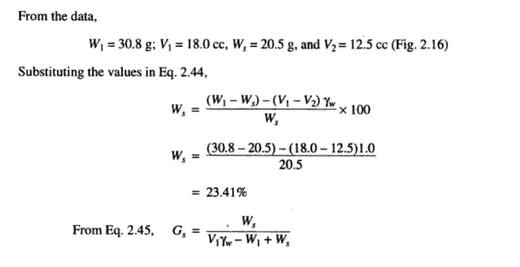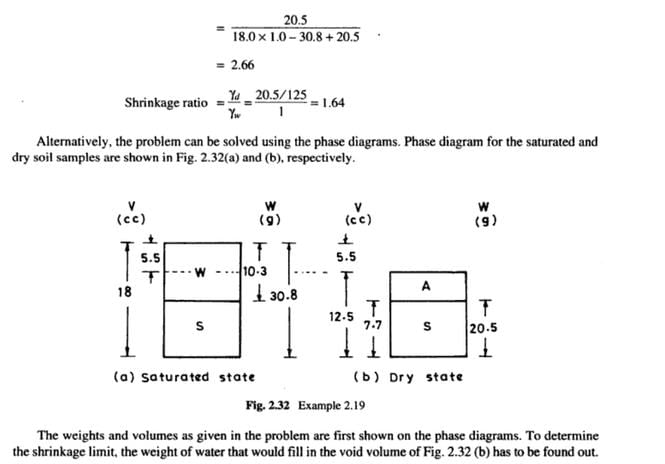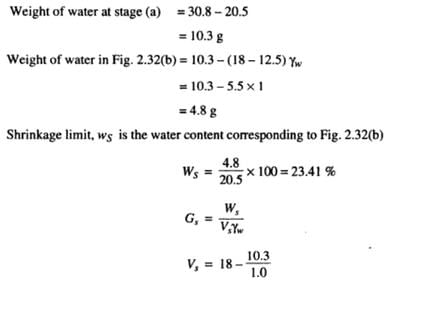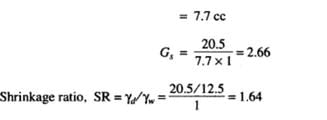Civil Engineering (CE) Exam > Civil Engineering (CE) Questions > An undisturbed soil sample of clay brought fr...
Start Learning for Free
An undisturbed soil sample of clay brought from the field was noted to have a volume of 18.0 cc and weight of 30.8 g. On oven drying, the weight of the sample was reduced to 20.5g. The volume of dried sample as obtained by displacement of mercury was 12.5 cc. Calculate shrinkage limit and the specific gravity of solids . Please share the solution for this?
Verified Answer
An undisturbed soil sample of clay brought from the field was noted to...




 This question is part of UPSC exam. View all Civil Engineering (CE) courses
This question is part of UPSC exam. View all Civil Engineering (CE) courses
Most Upvoted Answer
An undisturbed soil sample of clay brought from the field was noted to...
Solution:
To calculate the shrinkage limit and specific gravity of solids, we need to use the given information and perform the necessary calculations.
Step 1: Calculate the Shrinkage Limit
The shrinkage limit is defined as the moisture content at which further loss of moisture does not cause any significant decrease in volume. It is determined by comparing the volume of the undisturbed soil sample with the volume of the dried sample.
The initial volume of the undisturbed soil sample = 18.0 cc
The volume of the dried sample = 12.5 cc
Shrinkage limit = (Initial volume - Volume of dried sample) / Initial volume
Shrinkage limit = (18.0 cc - 12.5 cc) / 18.0 cc
Shrinkage limit = 5.5 cc / 18.0 cc
Shrinkage limit = 0.305
Therefore, the shrinkage limit of the soil sample is 0.305.
Step 2: Calculate the Specific Gravity of Solids
The specific gravity of solids is the ratio of the weight of the solids in a given volume of soil to the weight of an equal volume of water.
The weight of the oven-dried sample = 20.5 g
Specific gravity of solids = (Weight of oven-dried sample) / (Weight of an equal volume of water)
To find the weight of an equal volume of water, we need to use the density of water. The density of water is approximately 1 g/cm³.
Weight of an equal volume of water = Volume of dried sample * Density of water
Weight of an equal volume of water = 12.5 cc * 1 g/cm³
Weight of an equal volume of water = 12.5 g
Specific gravity of solids = 20.5 g / 12.5 g
Specific gravity of solids = 1.64
Therefore, the specific gravity of solids in the soil sample is 1.64.
Summary:
- The shrinkage limit of the soil sample is 0.305.
- The specific gravity of solids in the soil sample is 1.64.
Note: It is important to note that the specific gravity of solids can vary depending on the type of soil and its composition.
To calculate the shrinkage limit and specific gravity of solids, we need to use the given information and perform the necessary calculations.
Step 1: Calculate the Shrinkage Limit
The shrinkage limit is defined as the moisture content at which further loss of moisture does not cause any significant decrease in volume. It is determined by comparing the volume of the undisturbed soil sample with the volume of the dried sample.
The initial volume of the undisturbed soil sample = 18.0 cc
The volume of the dried sample = 12.5 cc
Shrinkage limit = (Initial volume - Volume of dried sample) / Initial volume
Shrinkage limit = (18.0 cc - 12.5 cc) / 18.0 cc
Shrinkage limit = 5.5 cc / 18.0 cc
Shrinkage limit = 0.305
Therefore, the shrinkage limit of the soil sample is 0.305.
Step 2: Calculate the Specific Gravity of Solids
The specific gravity of solids is the ratio of the weight of the solids in a given volume of soil to the weight of an equal volume of water.
The weight of the oven-dried sample = 20.5 g
Specific gravity of solids = (Weight of oven-dried sample) / (Weight of an equal volume of water)
To find the weight of an equal volume of water, we need to use the density of water. The density of water is approximately 1 g/cm³.
Weight of an equal volume of water = Volume of dried sample * Density of water
Weight of an equal volume of water = 12.5 cc * 1 g/cm³
Weight of an equal volume of water = 12.5 g
Specific gravity of solids = 20.5 g / 12.5 g
Specific gravity of solids = 1.64
Therefore, the specific gravity of solids in the soil sample is 1.64.
Summary:
- The shrinkage limit of the soil sample is 0.305.
- The specific gravity of solids in the soil sample is 1.64.
Note: It is important to note that the specific gravity of solids can vary depending on the type of soil and its composition.

|
Explore Courses for Civil Engineering (CE) exam
|

|
Similar Civil Engineering (CE) Doubts
An undisturbed soil sample of clay brought from the field was noted to have a volume of 18.0 cc and weight of 30.8 g. On oven drying, the weight of the sample was reduced to 20.5g. The volume of dried sample as obtained by displacement of mercury was 12.5 cc. Calculate shrinkage limit and the specific gravity of solids . Please share the solution for this?
Question Description
An undisturbed soil sample of clay brought from the field was noted to have a volume of 18.0 cc and weight of 30.8 g. On oven drying, the weight of the sample was reduced to 20.5g. The volume of dried sample as obtained by displacement of mercury was 12.5 cc. Calculate shrinkage limit and the specific gravity of solids . Please share the solution for this? for Civil Engineering (CE) 2025 is part of Civil Engineering (CE) preparation. The Question and answers have been prepared according to the Civil Engineering (CE) exam syllabus. Information about An undisturbed soil sample of clay brought from the field was noted to have a volume of 18.0 cc and weight of 30.8 g. On oven drying, the weight of the sample was reduced to 20.5g. The volume of dried sample as obtained by displacement of mercury was 12.5 cc. Calculate shrinkage limit and the specific gravity of solids . Please share the solution for this? covers all topics & solutions for Civil Engineering (CE) 2025 Exam. Find important definitions, questions, meanings, examples, exercises and tests below for An undisturbed soil sample of clay brought from the field was noted to have a volume of 18.0 cc and weight of 30.8 g. On oven drying, the weight of the sample was reduced to 20.5g. The volume of dried sample as obtained by displacement of mercury was 12.5 cc. Calculate shrinkage limit and the specific gravity of solids . Please share the solution for this?.
An undisturbed soil sample of clay brought from the field was noted to have a volume of 18.0 cc and weight of 30.8 g. On oven drying, the weight of the sample was reduced to 20.5g. The volume of dried sample as obtained by displacement of mercury was 12.5 cc. Calculate shrinkage limit and the specific gravity of solids . Please share the solution for this? for Civil Engineering (CE) 2025 is part of Civil Engineering (CE) preparation. The Question and answers have been prepared according to the Civil Engineering (CE) exam syllabus. Information about An undisturbed soil sample of clay brought from the field was noted to have a volume of 18.0 cc and weight of 30.8 g. On oven drying, the weight of the sample was reduced to 20.5g. The volume of dried sample as obtained by displacement of mercury was 12.5 cc. Calculate shrinkage limit and the specific gravity of solids . Please share the solution for this? covers all topics & solutions for Civil Engineering (CE) 2025 Exam. Find important definitions, questions, meanings, examples, exercises and tests below for An undisturbed soil sample of clay brought from the field was noted to have a volume of 18.0 cc and weight of 30.8 g. On oven drying, the weight of the sample was reduced to 20.5g. The volume of dried sample as obtained by displacement of mercury was 12.5 cc. Calculate shrinkage limit and the specific gravity of solids . Please share the solution for this?.
Solutions for An undisturbed soil sample of clay brought from the field was noted to have a volume of 18.0 cc and weight of 30.8 g. On oven drying, the weight of the sample was reduced to 20.5g. The volume of dried sample as obtained by displacement of mercury was 12.5 cc. Calculate shrinkage limit and the specific gravity of solids . Please share the solution for this? in English & in Hindi are available as part of our courses for Civil Engineering (CE).
Download more important topics, notes, lectures and mock test series for Civil Engineering (CE) Exam by signing up for free.
Here you can find the meaning of An undisturbed soil sample of clay brought from the field was noted to have a volume of 18.0 cc and weight of 30.8 g. On oven drying, the weight of the sample was reduced to 20.5g. The volume of dried sample as obtained by displacement of mercury was 12.5 cc. Calculate shrinkage limit and the specific gravity of solids . Please share the solution for this? defined & explained in the simplest way possible. Besides giving the explanation of
An undisturbed soil sample of clay brought from the field was noted to have a volume of 18.0 cc and weight of 30.8 g. On oven drying, the weight of the sample was reduced to 20.5g. The volume of dried sample as obtained by displacement of mercury was 12.5 cc. Calculate shrinkage limit and the specific gravity of solids . Please share the solution for this?, a detailed solution for An undisturbed soil sample of clay brought from the field was noted to have a volume of 18.0 cc and weight of 30.8 g. On oven drying, the weight of the sample was reduced to 20.5g. The volume of dried sample as obtained by displacement of mercury was 12.5 cc. Calculate shrinkage limit and the specific gravity of solids . Please share the solution for this? has been provided alongside types of An undisturbed soil sample of clay brought from the field was noted to have a volume of 18.0 cc and weight of 30.8 g. On oven drying, the weight of the sample was reduced to 20.5g. The volume of dried sample as obtained by displacement of mercury was 12.5 cc. Calculate shrinkage limit and the specific gravity of solids . Please share the solution for this? theory, EduRev gives you an
ample number of questions to practice An undisturbed soil sample of clay brought from the field was noted to have a volume of 18.0 cc and weight of 30.8 g. On oven drying, the weight of the sample was reduced to 20.5g. The volume of dried sample as obtained by displacement of mercury was 12.5 cc. Calculate shrinkage limit and the specific gravity of solids . Please share the solution for this? tests, examples and also practice Civil Engineering (CE) tests.

|
Explore Courses for Civil Engineering (CE) exam
|

|
Signup for Free!
Signup to see your scores go up within 7 days! Learn & Practice with 1000+ FREE Notes, Videos & Tests.
























